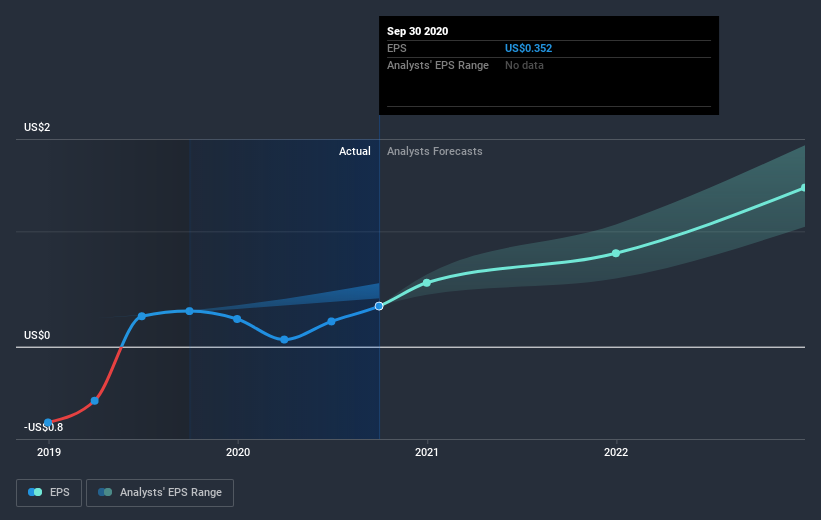- United States
- /
- Insurance
- /
- NasdaqGS:GSHD
Shareholders Are Thrilled That The Goosehead Insurance (NASDAQ:GSHD) Share Price Increased 195%

Unfortunately, investing is risky - companies can and do go bankrupt. But when you pick a company that is really flourishing, you can make more than 100%. For example, the Goosehead Insurance, Inc (NASDAQ:GSHD) share price had more than doubled in just one year - up 195%. It's also good to see the share price up 58% over the last quarter. We'll need to follow Goosehead Insurance for a while to get a better sense of its share price trend, since it hasn't been listed for particularly long.
See our latest analysis for Goosehead Insurance
While markets are a powerful pricing mechanism, share prices reflect investor sentiment, not just underlying business performance. One flawed but reasonable way to assess how sentiment around a company has changed is to compare the earnings per share (EPS) with the share price.
During the last year Goosehead Insurance grew its earnings per share (EPS) by 14%. The share price gain of 195% certainly outpaced the EPS growth. This indicates that the market is now more optimistic about the stock. The fairly generous P/E ratio of 361.22 also points to this optimism.
The company's earnings per share (over time) is depicted in the image below (click to see the exact numbers).

We know that Goosehead Insurance has improved its bottom line lately, but is it going to grow revenue? If you're interested, you could check this free report showing consensus revenue forecasts.
What About Dividends?
When looking at investment returns, it is important to consider the difference between total shareholder return (TSR) and share price return. The TSR is a return calculation that accounts for the value of cash dividends (assuming that any dividend received was reinvested) and the calculated value of any discounted capital raisings and spin-offs. Arguably, the TSR gives a more comprehensive picture of the return generated by a stock. As it happens, Goosehead Insurance's TSR for the last year was 198%, which exceeds the share price return mentioned earlier. The dividends paid by the company have thusly boosted the total shareholder return.
A Different Perspective
Goosehead Insurance shareholders should be happy with the total gain of 198% over the last twelve months, including dividends. A substantial portion of that gain has come in the last three months, with the stock up 58% in that time. Demand for the stock from multiple parties is pushing the price higher; it could be that word is getting out about its virtues as a business. I find it very interesting to look at share price over the long term as a proxy for business performance. But to truly gain insight, we need to consider other information, too. Consider for instance, the ever-present spectre of investment risk. We've identified 2 warning signs with Goosehead Insurance , and understanding them should be part of your investment process.
If you would prefer to check out another company -- one with potentially superior financials -- then do not miss this free list of companies that have proven they can grow earnings.
Please note, the market returns quoted in this article reflect the market weighted average returns of stocks that currently trade on US exchanges.
If you’re looking to trade Goosehead Insurance, open an account with the lowest-cost* platform trusted by professionals, Interactive Brokers. Their clients from over 200 countries and territories trade stocks, options, futures, forex, bonds and funds worldwide from a single integrated account. Promoted
New: Manage All Your Stock Portfolios in One Place
We've created the ultimate portfolio companion for stock investors, and it's free.
• Connect an unlimited number of Portfolios and see your total in one currency
• Be alerted to new Warning Signs or Risks via email or mobile
• Track the Fair Value of your stocks
This article by Simply Wall St is general in nature. It does not constitute a recommendation to buy or sell any stock, and does not take account of your objectives, or your financial situation. We aim to bring you long-term focused analysis driven by fundamental data. Note that our analysis may not factor in the latest price-sensitive company announcements or qualitative material. Simply Wall St has no position in any stocks mentioned.
*Interactive Brokers Rated Lowest Cost Broker by StockBrokers.com Annual Online Review 2020
Have feedback on this article? Concerned about the content? Get in touch with us directly. Alternatively, email editorial-team (at) simplywallst.com.
About NasdaqGS:GSHD
Goosehead Insurance
Operates as a holding company for Goosehead Financial, LLC that engages in the provision of personal lines insurance agency services in the United States.
High growth potential with solid track record.
Similar Companies
Market Insights
Community Narratives




